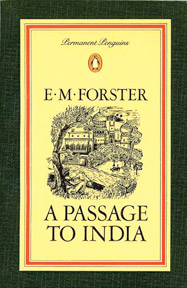Colonial India through E M Forster’s eye
K.S. SIVAKUMARAN
This column is primarily addressed to High School Students and
perhaps undergraduates and others interested in English Literature.
Therefore this writer avoids academic style of writing and tries to
explain in a style that even a Grade 8 student understands the subject
clearly.
|

E M Forster |
Hope our young readers have heard of the British writer EM Forster
and read his novels. Even if they did this piece may be of some interest
to them.
We shall therefore take one of his novels- A Passage to India – for
our analysis. The analysis would be that of the columnist’s supported by
views of eminent literary critics of repute. One such critic was the
Marxist oriented critic- Arnold Kettle. In spite of all this the critic
is astonishingly true to make us understand the novel clearly. Present
young readers are far removed from a period that has gone by. As such
they may find Forster a little uncomfortable to read in a quick mode of
comprehension. But the critic may not be.
What is the novel about? The central theme of the A Passage to India
seems to be the relationship between two characters in the novel: Aziz,
an Indian of Muslim faith and Fielding, an Englishman.
The writer states the subject of the novel clearly at the beginning
of the second chapter of the novel. One of the characters, Aziz, is
dining with two other Muslims ” They were discussing as to whether or
not it is possible to be friends with an Englishman”. This is precisely
what the novel is about. We must hasten to remember that the novel does
not depict the problems in India, even though in the course of the
exploration of the personal relationships we come to be aware of social
contexts of the period.
|

A Passage to India book cover |
Critic Arnold Kettle explains this aspect clearly—“Up to a point this
sense of arbitrariness of existence is one of the great virtues of this
novel”
He sums up further—“The sudden shafts of violence, of horrors, of
death and the indifference of the living to the dead, are e extremely
effective in the novel, both in conveying the actual unexpectedness of
life’s detail and in counteracting the urbane, high comedy tone of
Forster’s narrative manner.”
As a fiction the plot in the novel is contrived. This we understand.
The relationship between Aziz and Fielding scarcely survives because of
misunderstandings. The strain in the relationship is largely governed by
the “of the actual situation in which they exist- the strain of
Imperialism, which corrupts all its touches” Kettle suggests that “every
character, every theme and image contributes to the central pattern of
the book.”
There is the character of Miss Quested. Her own actions in the story
are convincing. She imposes problems on the Aziz-Fielding relationship.
In the last section of the book there is an interesting description of a
Hindu religious festival. It adds colour and variety to the scene and
incorporates an essential element in the problem confronting Aziz and
Fielding. As observed by Kettle. Forster uses religious themes and
symbols ‘not in the way of intellectual arguments but to deepen the
sense of intangible forces involved.
There is a little scene in the novel which I enjoyed. Fielding is
holding a tea-part in his garden office. There are two English ladies –
Mrs Moore and Miss Quested, the Muslim doctor Aziz and the Hindu
professor Godbole. Miss Queets’s fiancee, an Anglo-Indian, Ronny Herslop,
comes to drag the ladies away to watch some Polo. It was a rude act
breaking an interesting conversation among them.
Arnold Kettle rightly says that “Forster’s urbane honesty, his
infinitely sophisticated common sense, is at its very best in the
precise placing of personal relationships.
E M Forster’s novel A Passage to India is also a political novel
which explores with understanding and comparison, a political situation
in India in the years following the First World War But it is much more
than a mere political novel. The degrading effects of British rule in
India are effectively put across by the writer. The novel is an attack
on British rule in India. In a brief column like this, you would
understand that a detailed analysis of the novel would not be possible.
But it is the reader who could interpret the novel according to his or
her yardsticks in terms of contemporary critical tools. But in the fist
place the reader should red the book in full with critical appreciation.
[email protected].
|







